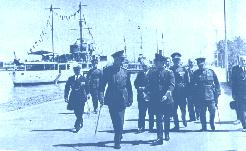
The Palang (Leopard) warship was launched
in Italy by Anoshiravan Sepahbody

November 5, 1997
The Iranian
From "Sunrise at Abadan: The British and Soviet Invasion of Iran, 1941" by Richard A. Stewart, Major U.S. Marine Corps. (Praeger, New York,1988). In memory of Admiral Bayandor and the many valiant Iranian navymen, airmen and soldiers who died in the 1941 surprise attack. And with thanks to Farhad Sepahbody.
As the first glimmer of dawn lit the misty horizon on the morning of August 25, 1941, the HMS Shoreham trained her forward gun battery on the Iranian warship Palang, which was moored peacefully at an Abadan pier. A moment later, a shell slammed into the Palang, the explosion engulfing the vessel in a ball of fire and smoke. As the listing warship settled into the river mud, British and Soviet armies stormed across Iran's borders - commencing perhaps the most dramatic and controversial untold episode of World War II.

The Iranian Sloop Babr (Cougar) after being shelled
by the British Navy in Iran's "Day of Infamy."
Attacked without provocation, neutral Iran suffered her own "Pearl Harbor" three months prior to the United States' more famous Day of Infamy. Iran's army was crushed, her monarch was overthrown, the beleaguered Red Army was saved from defeat, a German conquest of the Persian Gulf oil fields was thwarted, and the conditions were created for the opening showdown of the Cold War.
Few incidents of World War II relate more directly to the current crisis in the Persian Gulf than those described in this book. Sunrise at Abadan explains how -- more by accident than design -- the Anglo-Soviet invasion drew the United States deeply and inextricably into the affairs of Iran.
Sunrise at Abadan is intended as a scholarly rendition and analysis of these events and the attendant moral issues. In addition, the compelling political and human drama of this episode requires some portrayal to understand its moral significance.

Reza Shah (front with cane) reviews newly created fleet
accompanied by Admiral Bayandor with white cap (left)
Churchill viewed the issue as a simple choice: thwarting Nazi world conquest versus scrupulously observing international convention. The Prime Minister knew that he would require at least the tacit approval of President Franklin D. Roosevelt before attacking Iran. Roosevelt could have invoked U.S. moral authority and economic power to avert the Allied invasion.
But instead, his administration stood by passively, brushing aside desperate Iranian pleas until it was too late. Moreover, Roosevelt even secretly approved the plans against Iran, only to later publicly deny any knowledge of British intentions.
You can order Sunrise at Abadan from Amazaon.com, the world's largest online bookstore.





